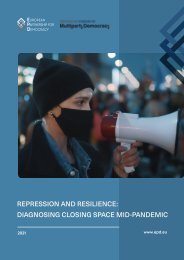Thinking Democratically: A Comprehensive Approach to Countering and Preventing Shrinking Space
You also want an ePaper? Increase the reach of your titles
YUMPU automatically turns print PDFs into web optimized ePapers that Google loves.
or specific voices that are deemed unacceptable, such as LGBTI groups or women HRDs. These<br />
findings are clearly reflected in the case studies conducted for this research paper.<br />
Restrictive legislation has been adopted in Guatemala, Kenya, Zimbabwe <strong>and</strong> Indonesia, but also in<br />
many European countries. In Kenya, the proposed Statute Law Amendment Bill in 2013 intended <strong>to</strong><br />
cap NGOs’ foreign funding at 15% of their <strong>to</strong>tal budget. In Guatemala, a new law establishes “control”<br />
mechanisms on NGOs, creating uncertainty about necessary permits <strong>and</strong> approval by the state for all<br />
their projects. Such laws restrict the ability of CSOs <strong>to</strong> operate, <strong>and</strong> thereby greatly infringe on their<br />
freedom of association. Such laws have been in place in Zimbabwe since the early 2000s. Other laws<br />
explicitly limit the kinds of activities NGOs can engage in, or their ideological orientation. The<br />
Indonesian NGO law gives a sentence of six months up <strong>to</strong> life imprisonment <strong>to</strong> anyone in an NGO who<br />
“embraces, develops or spreads ideology that is in conflict with (the state ideology) Pancasila.” As<br />
argued by Human Rights Watch Asia direc<strong>to</strong>r Phelim Kine, “the NGO law is being used as a vehicle for<br />
Orwellian thought police. The state has no business telling NGOs or anyone else what they can <strong>and</strong><br />
can’t believe.” 27<br />
An investigation in<strong>to</strong> civil society space by the EU’s Fundamental Rights Agency in 2018 identified a<br />
host of obstacles <strong>to</strong> a conducive regula<strong>to</strong>ry environment for civil society in Europe, including<br />
registration requirements, the adverse effects of legislation on counter-terrorism, political<br />
campaigning <strong>and</strong> lobbying, <strong>and</strong> bans on particular kinds of assemblies. In Greece, a Ministerial<br />
Decision effectively outlawed unregistered <strong>and</strong> independent NGOs <strong>and</strong> <strong>to</strong>ok control over NGOs on<br />
Lesbos isl<strong>and</strong>. In Irel<strong>and</strong> <strong>and</strong> the United Kingdom, lobbying <strong>and</strong> political campaigning legislation are<br />
defined such that it effectively limits CSOs’ funding sources <strong>and</strong> amounts, <strong>and</strong> spending during<br />
elec<strong>to</strong>ral periods. In contrast <strong>to</strong> these examples of restrictive legislation, Slovenia exempts CSOs<br />
promoting democracy, human rights <strong>and</strong> the rule of law from registration <strong>and</strong> reporting requirements<br />
on lobbying. 28<br />
Legislative restrictions limiting freedom of expression <strong>and</strong> press include licensing rules <strong>and</strong> laws<br />
criminalising the distribution of certain types of content. Such laws may criminalise certain content<br />
based on vaguely defined moral norms, as is the case in Indonesia, but it may also concern public<br />
information. In Honduras, a law was imposed that penalises the disclosure of classified information<br />
<strong>and</strong> limits public access <strong>to</strong> public information. In Zimbabwe, the Access <strong>to</strong> Information <strong>and</strong> Protection<br />
of Privacy Act was used <strong>to</strong> legally harass a number of journalists as well as shut down the only<br />
independent Zimbabwean daily newspaper. 29 The main perpetra<strong>to</strong>r of this type of onslaught on civic<br />
27<br />
Human Rights Watch, 2013: Indonesia: Amend Law on Mass Organizations. Available here.<br />
28<br />
EU Agency for Fundamental Rights (2018): Challenges facing civil society working on human rights in the EU. Available<br />
here.<br />
29<br />
ARTICLE 19 & Media Institute of Southern Africa (2004): The Access <strong>to</strong> Information <strong>and</strong> Protection of Privacy Act: Two<br />
Years On. Available here.<br />
15

















